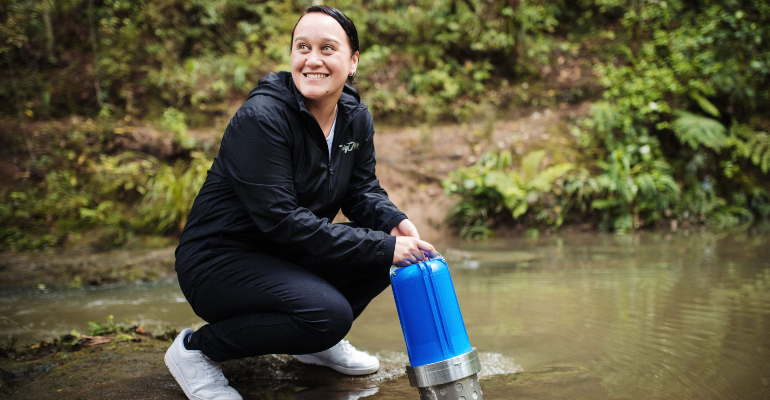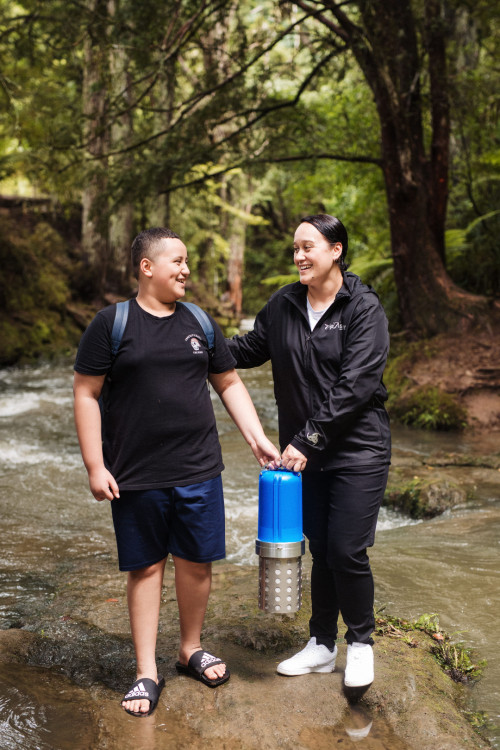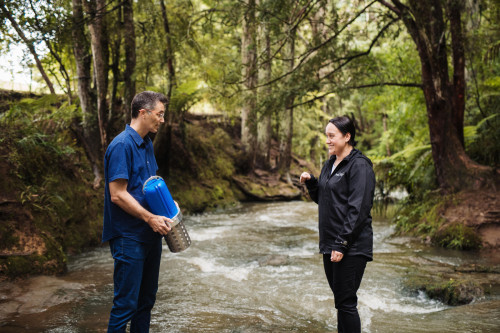
Dr Leonie Jones - Ngāpuhi, Ngāti Kahungunu ki Wairarapa
Protecting our rivers by connecting pure science with people
Science for Technological Innovation (SfTI) Seed fund researcher, Dr Leonie Jones (Ngāpuhi, Ngāti Kahungunu ki Wairarapa), has always loved science but it was her high school science teacher who inspired her to make it her career.
Her teacher was a Doctor of Philosophy (PhD) who spoke with such depth of knowledge that 15-year-old Leonie decided she too would become a PhD. Guided by her parents’ encouragement to use her inventive talent to change the world, she went on to study marine science and then chemistry to a PhD level, and eventually focussed her research on cutting-edge sensor technology.
Although it was pure science that has captivated her, it’s the potential for science to solve huge issues for the environment and the people around her which keeps her motivated. Her work has always been guided by the value of tiakitanga.
“The call for SfTI seed fund proposals was announced shortly after two-thirds of NZs rivers were declared unswimmable. I was inspired by the idea to create disruptive technology that would transform New Zealand,” Leonie said.
Leonie focused her Seed Fund proposal and research in general into developing a sensor to protect Aotearoa’s rivers.
“For me, it's always been about what science can do for us. It’s all about future generations - and ensuring they can have the same healthy relationship with the environment that we have had growing up,” she said.

When Leonie met the river Kaitiaki
The need to put innovative technology into the hands of non-scientists was made clear to Leonie when she connected with Millan Ruka (Te Urioroi, Te Parawhau, Te Mahurehure). Leonie was moved by how hard Millan, a local river Kaitiaki and founder of Environment River Patrol Aotearoa, was working to protect his river for the future.
Leonie’s connection with Millan changed her whole research direction because she could see how technology could help him care for his river.
“He was looking after the river and reporting pollutants, he would take photos and water samples but it took weeks for results to be returned. During that time the river was changing,” she said.
“I could see the pain he was in trying to protect his river and I thought, I can make this better for him,” Leonie said.
Through working with Millan, Leonie was able to identify the need for sensors that are designed to monitor river water quality at high resolution and in real-time. Leonie pivoted from solar energy research to developing sensors designed to monitor river water quality in real-time.
"We need to monitor our rivers every day, every hour, every kilometre, and we need to be able to see the data at the time it is collected - we needed new technology to do this", she said.
With support from SfTI’s Seed Fund, Leonie and her team at the Auckland-based research and development company, Digital Sensing Ltd, continued to work in partnership with Millan to create a product with wide potential application across Aotearoa’s waterways.
A real-time river water sensor designed with people in mind
By the completion of her Seed project this year, Leonie had successfully developed an autonomous river water quality diagnostic device. It uses purpose-developed electrochemical sensors, microfluidics, and electronics to answer in real-time the question, how clean is our river right now?
The device was designed with non-scientists in mind, so is portable and capable of being deployed in rivers and creeks for periods of 100 days without the need for maintenance or calibration. This means it protects our rivers with cutting-edge sensor technology, by simply enabling the people who love the rivers to get the information they need straight away.
Leonie says the river sensor project is now at the point of commercialisation.
"The sensors measure and report chemical pollutant levels. Now that we know what is in the water, we need to figure out how to remove it. New technology can solve this too, and so that is where my research will focus next."
Watch Leonie’s video story about her product:
You can’t save the world with science alone
Since the completion of her SfTI Seed project, Leonie has been part of a team working on using sensors to improve COVID-19 diagnostic tools. She has always been motivated by work that has huge potential to improve people’s lives, however, she has become increasingly aware that science alone cannot do this.
“I was happy working in the lab by myself for endless hours a day just focusing on science. But I have learned that you can’t save the world by yourself. You need to be able to take other people on the journey,” she said.
“I had to get out there and talk to people about my work and my vision. I'm a chemist and the business side of developing a product left me feeling overwhelmed. That is where the SfTI Capacity Development programme came in."
During her time with SfTI, Leonie has been supported to undertake media training, a pitching workshop, leadership training, mentoring, networking, video training, and commercialisation mentoring. SfTI’s Commercialisation Development Manager, Enrico Tronchin, provided Leonie and her team support to ensure they had the resources they needed to succeed.
“To have real impact researchers need the right resources around them to turn their groundbreaking science into a product that can be taken to market to solve real-life problems for people,” said Enrico.

For Leonie, this meant always bringing it back to the human factor.
“The SfTI Capacity Development opportunities I have had around communication and commercialisation, and especially the input my team received from Enrico, has taught me you can’t change the world from the lab. You need to always come back to what your science means for humans and how to communicate that in an engaging way. Thinking more about this has been groundbreaking for me.”